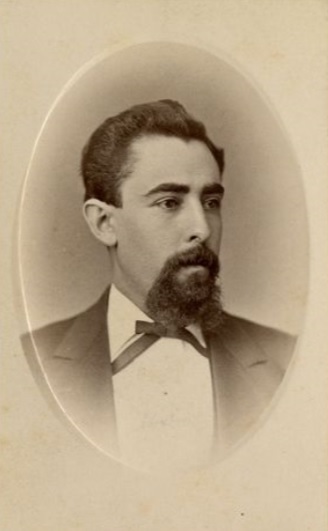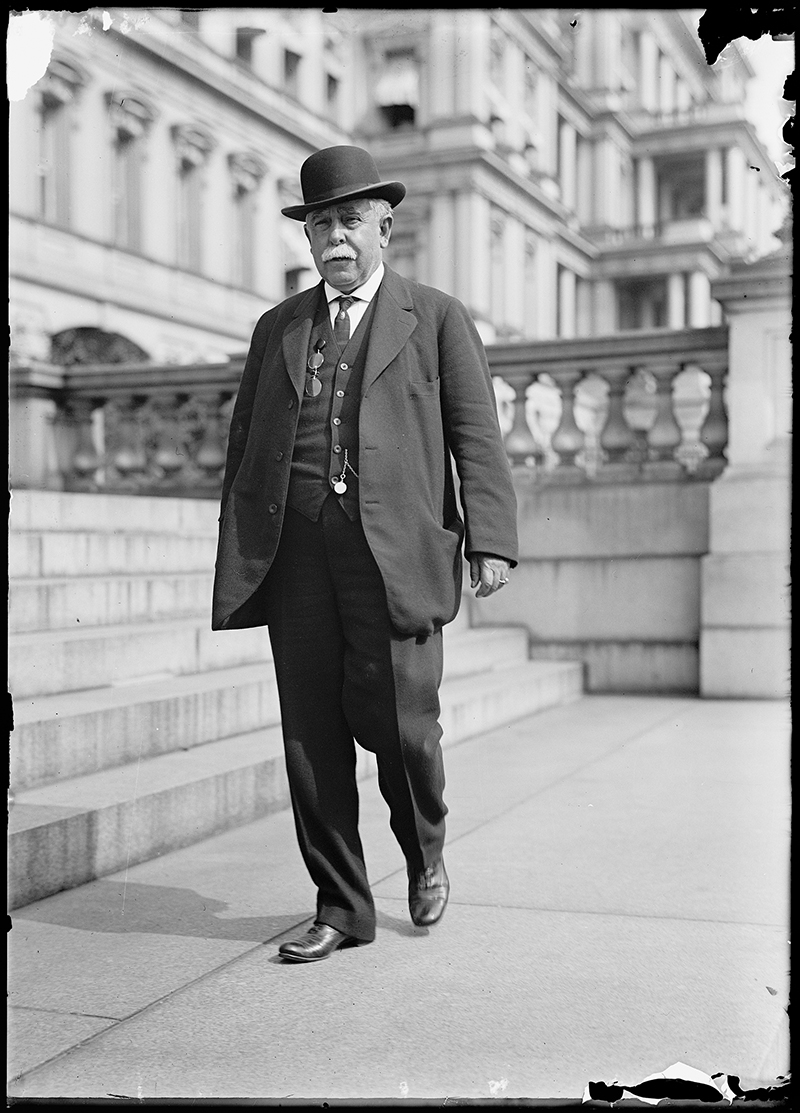|
|
R.F. Del Valle Recognized as UCLA's "Latino Forefather."
SCVHistory.com | Friday, May 24, 2019.
|
First photo: Dr. David E. Hayes-Bautista, director of the UCLA Center for the Study of Latino Health and Culture, shares the podium with Hillary Weireter (right), a Del Valle descendant and member of the Rancho Camulos Museum board of directors. * * * No longer is Reginaldo F. del Valle an unsung hero in the formation of the University of California, Los Angeles. Del Valle (1854-1938), whose father, Ygnacio, owned half the Santa Clarita Valley and whose formative years were split between Los Angeles and Rancho Camulos, was not present for — and might not even have been invited to — the dedication of the current Westwood campus in 1930, university officials said Friday. And yet, without him, UCLA would not be UCLA. It would be UC Pasadena or something else. Why? Because decades earlier, in 1881, Del Valle was the Sacramento politician who championed legislation — and donated some of his own land in downtown Los Angeles — to create the Los Angeles State Normal School, a college for training teachers. It was the first state institution in Southern California that wasn't an asylum or prison.
Dial up the clock. As World War I was ending, the UC Regents were shopping around for a second existing campus to take over, as they had done in Berkeley. They settled on the L.A. State Normal School, which had moved to Vermont Avenue in 1914. (They took a pass on Throop University, which would become Caltech.) Friday was selected as the date to honor Del Valle because it is UCLA's 100th birthday week. Almost exactly a century earlier, on May 23, 1919, California Gov. William D. Stephens signed Assembly Bill 626 into law, transfering control of the Normal School and its assets to the UC Regents — thus establishing UCLA or, as it was called in 1919, the Southern Branch of the University of California. Dr. David E. Hayes-Bautista considers Del Valle the university's Latino forefather. A professor of medicine, Hayes-Bautista is the director CESLAC, the Center for the Study of Latino Health and Culture at the UCLA David Geffen School of Medicine. CESLAC researcher Cynthia L. Chamberlin said it is only recently that the full extent of Del Valle's involvement was starting to be understood as she and her colleagues pored through documents at UCLA and other institutions including Del Valle family papers at the Huntington Library, state archives, and old newspapers that are newly accessible online. With an invigorating march through campus and a student mariachi band and folklorico dancers performing traditional music and dance from the 1880s, Friday's ceremony at UCLA's Founders' Rock, outside Murphy Hall, was both a recognition of Del Valle's specific contributions and an acknowledgement of the institution's — and the region's — broader multicultural underpinnings. Like many members of Mexican aristocracy, Del Valle's father was born in Mexico "proper," and his mother was born in California when it was still Mexico. Reginaldo, born in Los Angeles under American rule, "grew up bilingual and bicultural, at home in both Latino and Atlantic-American civil society," Chamberlin and co-writers state in the program book (below).
After law school, Reginaldo was elected to the state Assembly in 1879, just shy of his 25th birthday, and he was named president pro-tem of the state Senate in 1882 at age 27 — the youngest ever. He ran for Congress in 1884 and lost, but he remained prominent in Democratic and Los Angeles City politics. Most significantly, beginning in 1908 he served for 21 years on the L.A. Public Services Commission, aka Water and Power Commission, which piped water down from Owens Lake. As such, he was one of William Mulholland's bosses and helped make the growth of modern Los Angeles possible. Reginaldo's daughter, Lucretia, followed in her father's footsteps, to a degree; she was politically active even before she married an American diplomat. She was an early campaigner for Ed Roybal, who in 1947 co-founded a Latino civil rights organization that Cesar Chavez later headed, and Roybal would later co-found the Congressional Hispanic Caucus. Hayes-Bautista said CESLAC is seeking contributions to pay for a portrait or statue of Del Valle — preferably a statue, he said — "to be installed in a prominent place on campus alongside those of other persons who have played a significant role in the university's history and development." The memorial object would become "a lasting symbol of the impact Latinos continue to have on research, education and public service, both on the UCLA campus and throughout the world." Hayes-Bautista said his plan is to meet back in one year at Founder's Rock for the unveiling of whatever Del Valle memorial can be commissioned using donations that come in. To contribute, visit https://spark.ucla.edu/project/15808.
Click here to read more about Reginaldo F. del Valle.
Digital images by Leon Worden, except for the last (LW3543x.jpg). |
• C. Rasmussen Story
Ygnacio Family Tree
Ygnacio 1808-1880
Family History: Del Castillo 1980
Del Valle Branding Iron, RSF 1830s-40s x5
Livestock Ledger 1853
History of Ownership
Wolfskill Foreclosure 1864
Labor Records
1919-1924
Ygnacio's L.A. Property 1871
Envelope: Reginaldo to Ysabel 1877–1883
James Walker Art
(1818-1889)
Ygnacio Bio 1889
Ysabel 1837-1905
Description 1879
Bedroom ~1890
Reginaldo Nominated Lt.Gov. 1890
Pico Oil Connection
Probate Filing, Death of Juventino, 1919
Reginaldo 1854/1938
Reginaldo Bio 1889
Lucretia 1892/1972 (Multiple Entries)
Nor. Cal. Basket mid-1800s
Bell, Portrait Come Home 10/28/2017
Reginaldo Recognized at UCLA 5/24/2019
|
The site owner makes no assertions as to ownership of any original copyrights to digitized images. However, these images are intended for Personal or Research use only. Any other kind of use, including but not limited to commercial or scholarly publication in any medium or format, public exhibition, or use online or in a web site, may be subject to additional restrictions including but not limited to the copyrights held by parties other than the site owner. USERS ARE SOLELY RESPONSIBLE for determining the existence of such rights and for obtaining any permissions and/or paying associated fees necessary for the proposed use.

























